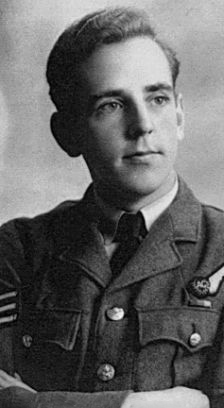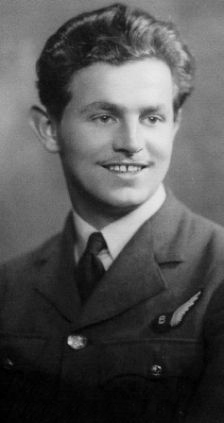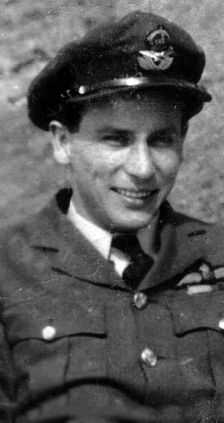102 (Ceylon) Squadron
Tentate et perficite (Attempt and Achieve)
Flight Sergeant Reginald Wilson
Page 2 - Dulag Luft
On arrival we were all searched again and put in separate cells, with just our clothes and no possessions. The cells were entirely plain and featureless, with just bed, a straw filled palliasse, a chair and a small table. There was an electric wall heater, not for our benefit but for our discomfort, as it turned out.
So here I was in solitary confinement, more or less in a void after all that had happened since leaving England. There was nobody to talk to, nothing to write with, no noise, nothing to see, just your thoughts to review over and over again.
It was almost a pleasure when an apparent civilian came into the cell. Of course it was the ‘Red Cross representative’ we had been warned about on the squadron. He had come in with a bogus Red Cross form to get all my details, starting with my name etc, my next of kin, and ending up with squadron details etc. I said that, under the Geneva Convention, I was only allowed to give my name, rank and number, and after some discussion he left, having offered me a cigarette, which I took. Shortly after that the electric heater came on and the cell began to get very hot, so hot in fact that I was able to smoulder a piece of straw from the palliasse to an ember (by poking it into the heater element) but not enough to light the cigarette I had been given. The overheating was another ploy to unsettle you, because you couldn’t sleep or relax at all, and the temperature could reach 120F or more.
The next day I was taken to an interrogator, who was very polite and civilised. He started to talk about the war and then produced a photograph of the H2S radar equipment I used for navigation and blind bombing runs. He asked what it was, and I said I did not know. He then tried another tack, saying that I could be a spy and they needed evidence to prove that I wasn’t. I was then taken back to the cell to endure another hot day and night. During this time, the only food we got each day was just watery soup, rye bread spread with ‘marg’ or some sort of jam, and a drink of acorn coffee. The following day was my 21st.birthday and I was taken back to the interrogator. He started off again on me proving my identity, I still quoted my name, rank, and number, and in the end he got bored and produced a dossier of my squadron (102 Squadron), saying that it was one of their best customers.
I was amazed that he had details of my squadron and I would have dearly liked to have asked him whether any of my crew were alive. It was not until after the war that I learned that Dulag Luft were able to identify squadrons by the number painted on the side of the aircraft. Obviously they were able to match the crew survivors with the close proximity of the aircraft wreckage. He was also accurate about numbers of prisoners, as 102 Squadron was the second highest squadron for numbers of POWs taken in Germany for the whole of Bomber Command. After this episode my interrogation was over, and I asked the interrogator whether I could have a shave, as it was my 21st. birthday! He arranged this for me.
I was transferred the following morning to the Dulag Transit Camp at Frankfurt am Maine and my few possessions were returned to me - except for my photographs and cigarettes which had been ‘lost’, and my astro-navigation watch which was confiscated under ‘war regulations’. But for the watch I got an official receipt!
My interrogation period was about average, but some were in solitary confinement for many days. I can only assume that much depended on the ‘intake’ of prisoners. In January 1944, the losses to Bomber Command (and presumably the American Air force) were high, about 10%. Because of the increasing numbers and the limited number of cells, it may not have been possible for Dulag Luft to arrange longer periods of solitary confinement at this time.
I was overjoyed to meet John Bushell (my rear gunner) in the party transferred to the Transit Camp. John had a bad cut over is right eye, which luckily had healed up reasonably well. After we were hit, the plane had gone into a spiral dive, causing him to hit his head on his guns, so he was in a dazed state. The plane blew up near the ground, and John only survived because he was blown out and able to open his parachute in time. He landed on a searchlight battery and was taken into custody immediately. I think he was 24 hours ahead of me arriving at Dulag Luft. He told me he had met Laurie Underwood (my bomb-aimer who followed me out of the aircraft) at Spandau in West Berlin. Laurie was captured by the Wehrmacht whilst he was walking westwards through the night, away from Berlin. We also learned later that George Griffiths (our pilot) was safe, but we had no knowledge of the four remaining members of our crew. Details of George’s survival and the four missing crew were not known to me until after the end of the war.
After my experience so far, the Dulag Transit Camp indicated a substantial change that would take place in our daily lives, due to the fantastic support of the International Red Cross. Without this Organisation many would have died, or at least would have suffered ill health for the rest of their lives. We were now prisoners of war but we would not be officially registered until we were moved to the next camp (although we had been photographed already with our RAF service number).
The Transit Camp, although under the control of the Luftwaffe, was run internally by a small group of RAF officers and sergeants (all aircrew prisoners of war). There were about 200 prisoners and we stayed for two days. During this time we were given essential clothing like boots, overcoats, and, almost unbelievably, a fibre case containing many items like, socks, underclothes, sewing kit, cigarettes, tobacco, pipe, chewing gum, soap, toothbrush, razor, and even pyjamas. On baling out some had lost their flying boots and had damaged clothing. It was also winter in Germany and no-one of course had any other kit. All these items were supplied through the International Red Cross. (At this time the items we received were mainly American.)
The Camp was well stocked with Red Cross food parcels and together with the basic German rations, the ‘RAF Staff’ was able to produce impressive meals in the communal mess. They were almost sumptuous considering we had hardly eaten for over a week or more!
We were also able to send a postcard to our next of kin, which hopefully would get home in a month or so. I wrote:-
“My Dear Mum & Dad, I am now in Germany. You cannot write until I reach a POW camp. Please keep in touch with the Red Cross. I am unhurt and quite well. Please tell Pat I am safe. Meanwhile do not worry at all. All my love, Reg”
On departure we were each given an American Red Cross food parcel. In some ways it was sad to leave the Transit Camp after such a dramatic change in our fortunes. But the Camp was within a mile of Frankfurt’s main railway station and I knew the town was due for more bombing attacks soon. In fact the Camp suffered severe damage, with some casualties, seven weeks later and had to be moved out of Frankfurt.
A large party of us were assembled and moved to the railway sidings where we were put into ‘cattle trucks’ (presumably old French Army trucks), marked 8 chevaux 40 hommes, although there were more than forty of us to each truck. We were now in the hands of the Wehrmacht and not the Luftwaffe. These trucks, with a few bales of straw added, were to be our living quarters for the next three days. Our fortunes had come down with a bump!
John and I had not met Laurie nor George in the Transit Camp and I can only assume that they were ahead of us and were already on their way to Stalag Luft3. I might have been with them had my commission come through on time. As it was, John and I were travelling together on our way to Stalag1VB, Muhlberg on Elbe, a town about 30 miles east of Leipzig and about 65 miles south of Berlin.
The journey to Stalag1VB was a nightmare. Each truck had an armed guard, standing by a partly opened door (for ventilation), but there was barely room to squat on the floor of the truck, let alone room for sleeping. There was one bucket for urinating in, slopping about in the straw in the centre of the truck. And occasionally the train would stop when we were allowed out in a long line, to drop our trousers and defecate beside the rail track! Our only pleasure was to enjoy some of the contents of our first food parcel (that which didn’t need a tin opener!), together with a meagre portion of German black bread.
We arrived at Neuburxdorf railway sidings near Muhlberg, although we could not see the town, and we were ushered out on to the road about a mile or so from Stalag1VB. The scene looked like Siberia. There had been a recent fall of snow which had partially thawed and there was slush everywhere. Before us was a flat desolate plain and just a blur in the distance, which was our destination.
Page 1 - Page 2 - Page 3 - Page 4 - Page 5 - Page 6 - Page 7 - Page 8 - Page 9 - Page 10



